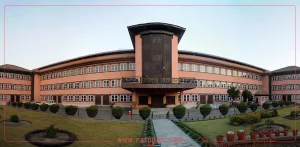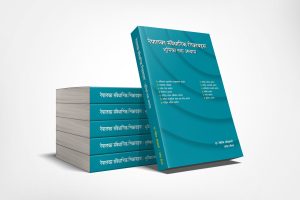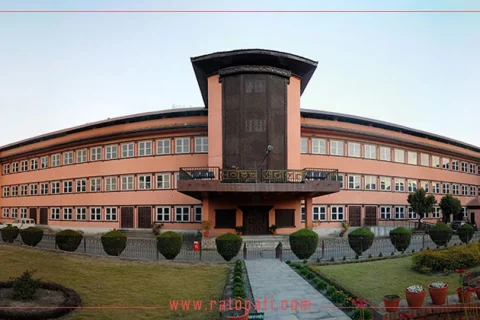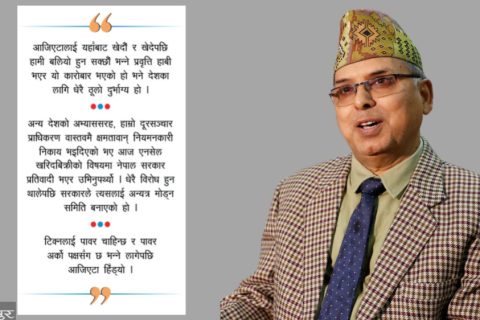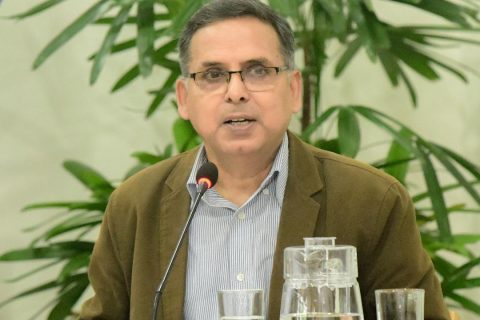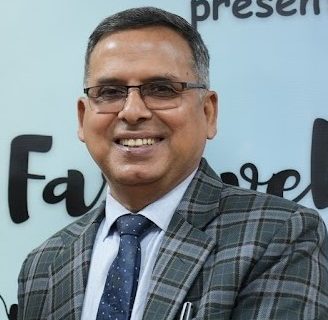Roundtable Discussion on “Establishing a New School of Law at Kathmandu University: Prospects and challenges” Thursday, September 26, 2013. Organizers: Kathmandu University (KU), Alliance for Social Dialogue (ASD) & Nepal Constitution Foundation (NCF), Kathmandu
In alliance with Kathmandu University (KU) and Alliance for Social Dialogue (ASD), Nepal Constitution Foundation (NCF) organized a review discussion on establishing a new School of Law at Kathmandu University. The main focus of the discussion was the “prospect and challenges” facing the Kathmandu University School of Law Steering Committee and others involved in the project.
The discussion was attended by members of the School of Law Steering Committee, senior officials from Kathmandu University, former KU Vice Chancellor, former Chief Justice of the Supreme Court of Nepal, law advocates and staff members from NCF as well as ASD. The chief speaker of the program was Professor Dr. M.P. Singh, a leading constitutional expert of India and the former Dean of Law Faculty at Delhi University.
Following a welcome note by Dr Bipin Adhikari, the Coordinator of School of Law Steering Committee, the program was initiated through Dr. Sharma’s brief introduction about the formation and evolution of Kathmandu University from the day of its inception, till its current status, and the establishment of the School of Law. It was followed by Dr. M.P. Singh’s presentation on the “prospects and challenges” of forming a Law School at Kathmandu University. Subsequently, a discussion was held with the members involved raising concerns and seeking Dr Singh’s expertise.
In his introduction, Professor Dr. Suresh Raj Sharma, the founder Vice Chancellor of Kathmandu University, began with concept of Law and Democracy as intrinsically linked entities. He remarked; “there cannot be democracy without the rule of law.” Similarly, he followed highlighting the importance of law in other spheres of societal design such as politics, economics, environment, geography etc. According to him, the prospect of law as a discipline has not gained adequate advancement citing various reasons such as social stigma associated with lawyers, misconception regarding the role of law in creating and sustaining society etc. Despite its popularity as a profession, law schools are still not up to the mark in Nepal. As a result, Law as an academic discipline couldn’t prosper here.
In terms of Kathmandu University, Professor Dr. Sharma highlighted, subsequent to the formation of KU, a thorough evaluation of pertinent areas within the confines of university resources. In terms of international standards, Nepal was lagging behind in most academic disciplines ranging from technologies to the social sciences. Lack of infrastructure and qualified manpower meant that KU had to prioritize certain sectors at the expense of others. According to Dr. Sharma, disciplines such as sciences and technologies received preferential treatments initially. However, as the university gradually started expanding, other areas of studies were incorporated with the view of creating national standards and matching growing advances in the international area. In light of this, the School of Law was envisioned in the early 21st century which would garner the best students and faculty and help build leaders in professional areas through quality legal education.
In terms of KU’s administration, Dr. Sharma highlighted that the university is a non-governmental, not for profit, autonomous institution dedicated to academic excellence. From its inception in 1990, KU strived from autonomy. In addition, the university favored interdisciplinary approach to education. Moreover, demand of market was regarded as one of the fundamental principles guiding the administration towards inception of new disciplines. The growing influence of globalization compelled the university to constantly upgrade and incorporate new technologies. As a result, research and development were seen as a vital component in the modernization of the University’s standards.
In light of this, a question beckoned as to reluctance of Kathmandu University to start a law school earlier. According to Dr. Sharma, the simple answer is that there was a lack of qualified manpower. In addition, he justified the lack of resources including management issues and adequate infrastructure as other serious major obstacles in the prior formation of the School of Law. Proximately, complexities regarding adequate location to promote healthy environment for law graduates to develop and prosper were established. Consequently, Dr. Sharma went on to remark that all these aspects had been thoroughly considered and revised. Hence, it was with a lot of excitement, he remarked that the Kathmandu University was finally prepared to take on the task at hand of establishing the School of Law.
Dr. Sharma’s introduction was followed by the presentation of Dr. M.P. Singh regarding the “prospects and challenges” of forming a School of Law at Kathmandu University. Dr. Singh started the presentation outlining the object of legal education. According to him, the main object of legal education is to identify law as organizing principle of modern society. This principle operates at two levels:
1. Primary: Developing the vision of society to be realized through law.
2. Secondary: Dispute Resolution Mechanism.
Dr. Singh then went on shed light on Dr. Sharma’s remarks regarding the lack of development of law as an academic discipline. According to Dr. Singh, one of the main reasons behind law gaining less popularity in our society was due to the inherent misconceptions as regards to role of law. He followed that we have confined ourselves to the dispute resolution mechanism aspect of law whilst neglecting the primary role law plays in organizing the vision of the society. Next, Dr. Singh also stressed that the onus of establishing an approach of law as a vision of the society we want to create should be developed through law schools and academics as law courts and lawyers are primarily engaged with the dispute resolution mechanism aspect of law. In addition, Dr. Singh adverted the role Western academic scholars have played through extensive research in creating a vision of society through law. Consequently, he engaged the evolution of European legal sphere in contrast to that seen in South Asia and other parts of the world where law as a discipline has had a relatively short history. According to Dr. Singh, emphasis must be given to develop the primary aspect to law muck akin to the evolution of Roman law to “Common Law” and “Civil Law” through academic endeavors.
In terms of how legal education should be organized, Dr. Singh began with the concept of clear distinction approach regarding Public law and Private law domain. According to him, modern day tendencies have seen a far greater emphasis put on private law education at the expense of Public law discipline. Dr. Singh emphasized that a balanced approach should be considered to incorporate both domains and create a complete holistic legal education. Similarly, Dr. Singh advocated for a system that helps students develop strong theoretical foundations as well as provide avenues for them to acquire practical knowledge. In addition, Dr. Singh emphasized that law schools must make distinction between principles of foundational law that apply more or less to everyone from specific laws that apply from specific cases. Moreover, Dr. Singh advocated for the inclusion of variety of optional courses to complement the compulsory courses and provide the students with an interdisciplinary freedom associated with quality legal education.
In terms of pedagogy, Dr. Singh was quick to erase doubts regarding the right way to educate students. According to him, there is no perfect way to teach, however, he did promulgate the Socratic formulation as proposed by the School of Law as a widely accepted version. In addition, he stressed the need for the students to have internship opportunities. According to him, it is paramount for legal graduates to have exposure and the onus is on academic faculty to provide avenues for students to help them understand the realities of society. In this context, the legal scholars have a role to play in eradicating the inequities of society. Next, Dr. Singh elaborated on two such instances in India where legal communities have sought to eradicate some of the social injustices in society: 1. Newly passed food legislation whereby 75% of food will be available in the rural areas. And; 2. New laws pertaining to prostitution whereby prostitutes would be allowed to stand on the side of the road without being harassed by the police.
In terms of maintaining high educational standards, Dr. Singh highlighted that it was imperative to acquire qualified faculty members as well as outstanding students. In terms of students, Dr. Singh stressed the need for a system that allows the university to garner the best talent from the entire country. He suggested holding entrance tests which has been widely successful in India in the past. Similarly, he advocated for the need to cultivate diversity as the KU School of Law has proposed to make legal education inclusive to all social groups and ethnicities. In addition, he suggested providing additional incentives for prospective students through scholarships, bank loans etc to create a diverse pool of law graduates. In terms of faculty, Dr. Singh stressed the need to acquire and retain highly qualified faculty members. Most people prefer to go into profession rather than academics for various reasons including financial reasons. Dr. Singh suggested a need for system that provides adequate incentives for legal academics to pursue a career in legal education. Similarly, he suggested hiring individuals with foreign experience to provide innovative ideas and introduce positive alternative teaching methods. In addition, Dr. Singh advocated for a system to facilitate visiting faculty to come and teach. In addition to providing students diverse legal perspective, the interaction between multiple faculties would be beneficial for the development of both the faculty and the university.
Following Dr. Singh’s presentation, a discussion was held where the members participating in the program discussed some of the issues raised in the presentation. Mr Hari Sharma of ASD raised concerns on the issue of interdisciplinary approach in law school. He started by acknowledging the relatively recent origin of social sciences school at KU and exhorted the need for greater dialogue to include social science and law school to create an interdisciplinary approach. In addition, he propounded that the need for an interdisciplinary approach between law and other disciplines including social sciences as a driving factor in garnering a larger population of prospective students. Affirming Hari Sharma’s views, Dr. Singh promoted interdisciplinary approach and argued that such a system would provide impetus for interacting faculties to develop and prosper. Subsequently, the issue of acquiring qualified faculty members was raised by Professor Sanjay Nath Khanal, who heads Accreditation Office of KU citing the prevalent problem of people preferring professions over academics. Similarly, on the issue of providing electives, he posed complexities embedded in providing a diverse array of electives from the onset. Rather, a gradually expanding approach was mooted with a view to incorporate an interdisciplinary approach. Subsequently, the difficulties involved with scouting diverse population were discussed. Mr. Sitaram Adhikary, the former registrar of KU, highlighted the difficulties inherent in implementing an all inclusive system drawing from past experiences in KU medical school. Again, the issue of self-sustainability was also raised. Adhikary also advocated the idea of research as one of the solutions to combating financial compatibility in order to achieve self-sustainability. In addition, Dr Surya Dhungel brought forward the challenges in maintaining the standards of the institution ensuing the loss of quality faculty members.
In conclusion, Dr. Singh suggested higher fees and providing research as a possible outlet way to combat financial issues. According to him, students will have to contribute to attain quality legal education. Drawing on Indian context, he highlighted the provisions of banks providing loans for students to pursue education on the basis of recommendation by universities. In terms of student inclusiveness, Dr. Singh highlighted the constitutional support as one of the main reasons in its success. He mooted for a similar provision to be incorporated in Nepalese constitution. Lastly, Dr. Singh strongly advocated for a system that would help attract and retain quality faculty through steps such as higher salary, incentive packages, providing certain freedoms to teachers etc. As a result legal scholars would be reluctant to seek other opportunities, thus securing the standards and prosperity of the university.
The programme was facilitated by Dr. Suresh Raj Sharma and concluded by Dr. Bipin Adhikari thanking participants for taking time to participate in the discussion.


